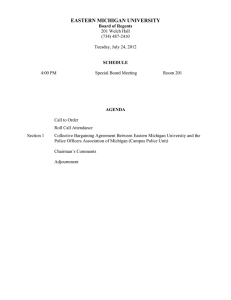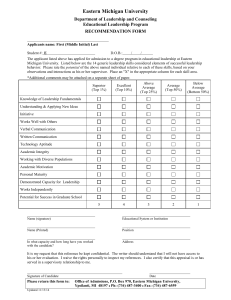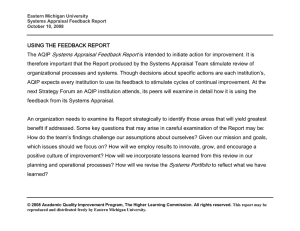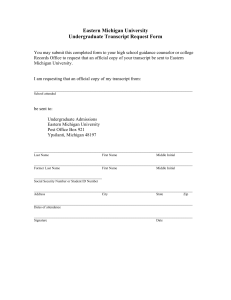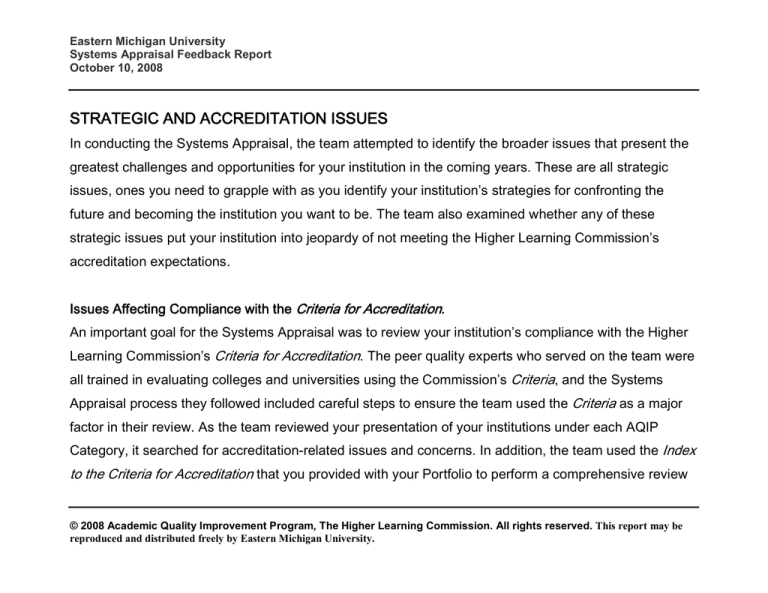
Eastern Michigan University Systems Appraisal Feedback Report October 10, 2008 STRATEGIC AND ACCREDITATION ISSUES
In conducting the Systems Appraisal, the team attempted to identify the broader issues that present the
greatest challenges and opportunities for your institution in the coming years. These are all strategic
issues, ones you need to grapple with as you identify your institution’s strategies for confronting the
future and becoming the institution you want to be. The team also examined whether any of these
strategic issues put your institution into jeopardy of not meeting the Higher Learning Commission’s
accreditation expectations.
Issues Affecting Compliance with the Criteria for Accreditation.
An important goal for the Systems Appraisal was to review your institution’s compliance with the Higher
Learning Commission’s Criteria for Accreditation. The peer quality experts who served on the team were
all trained in evaluating colleges and universities using the Commission’s Criteria, and the Systems
Appraisal process they followed included careful steps to ensure the team used the Criteria as a major
factor in their review. As the team reviewed your presentation of your institutions under each AQIP
Category, it searched for accreditation-related issues and concerns. In addition, the team used the Index
to the Criteria for Accreditation that you provided with your Portfolio to perform a comprehensive review
© 2008 Academic Quality Improvement Program, The Higher Learning Commission. All rights reserved. This report may be reproduced and distributed freely by Eastern Michigan University. Eastern Michigan University Systems Appraisal Feedback Report October 10, 2008 of the Criteria and each Core Component to ascertain whether you presented compelling evidence that
your institution complies with each of these Commission expectations.
The Systems Appraisal team concluded that Eastern Michigan University has presented evidence
that it complies with each of the Five Criteria for Accreditation and each of their Core Components.
Although the Systems Appraisal does not in itself constitute a review for continued accreditation, the
team’s conclusion upon reviewing your Portfolio against the Criteria will serve as a telling piece of
evidence during the Commission’s next scheduled AQIP review of your institution for Reaffirmation
of Accreditation.
Issues Affecting Future Institutional Strategies. The Systems Appraisal Team identified the following
strategic issues to assist Eastern Michigan University in prioritizing and taking action on the important
broad challenges and opportunities it faces. From these you may discover your vital immediate priorities,
shaping strategies that can lead to a quantum leap in the performance of your institution. Implementing
these strategies may call for specific actions, so AQIP’s expectation that your institution be engaged in
© 2008 Academic Quality Improvement Program, The Higher Learning Commission. All rights reserved. This report may be reproduced and distributed freely by Eastern Michigan University. Eastern Michigan University Systems Appraisal Feedback Report October 10, 2008 three or four vital Action Projects at all times will help encourage your administrators, faculty, and staff to
turn these strategic goals into real accomplishments. Knowing that Eastern Michigan University will
discuss these strategic issues, give priority to those it concludes are most critical, and take action
promptly, the Systems Appraisal Team identified:
· Eastern Michigan University has identified two of its key institutional challenges as “forming an
effective and forward-looking leadership team” and “improvement of relationships between the
faculty and administration.” While the portfolio notes some important initiatives to address these
interrelated challenges, the University will need to maintain a commitment to improving leadership
and addressing the perceptions of leadership problems. The recent history of the University
includes the rapid turnover of presidents based on ethical concerns, turbulent relations with labor,
especially with faculty, and a high-profile on-campus homicide. At this point, measures of effective
leadership are undeveloped and processes for leadership succession are weak at best.
Processes for incorporating the input of stakeholder groups are uneven across the various
University operations. Efforts to address these concerns are underway, with new strategic
planning processes and leadership development programs. But much remains to be done and
progress can be easily stalled, given the range of challenges the University has identified. Insuring
© 2008 Academic Quality Improvement Program, The Higher Learning Commission. All rights reserved. This report may be reproduced and distributed freely by Eastern Michigan University. Eastern Michigan University Systems Appraisal Feedback Report October 10, 2008 effective, stable and forward-looking leadership is essential to strengthening a shared
commitment to the University’s future among faculty, students and other stakeholders.
· Benefit could be derived from addressing several issues related to data. First, there is a lack of
results in the Systems Portfolio that depict any trend, segmentation, and overall performance. For
example, a chart or graph that highlights the performance for several years would provide the
examiners and key institutional employees and stakeholders with key information. Second, the
institution would benefit from collecting, graphing, and using comparative data. The use of
comparative data would allow the institution the ability to measure its performance against similar
(or different) types of institutions.
· The University could benefit from clearly delineating key systems and processes. Specifically,
Eastern Michigan University should develop processes (approaches) that are deployed across the
institution instead of just in a few organizational units.
· The team is aware that the strategic plan for the University is new (2008) and developed by senior
administration. It will be important before the Checkup visit for the University to demonstrate that
strategic planning is a continuous process involving all stakeholders.
© 2008 Academic Quality Improvement Program, The Higher Learning Commission. All rights reserved. This report may be reproduced and distributed freely by Eastern Michigan University.

